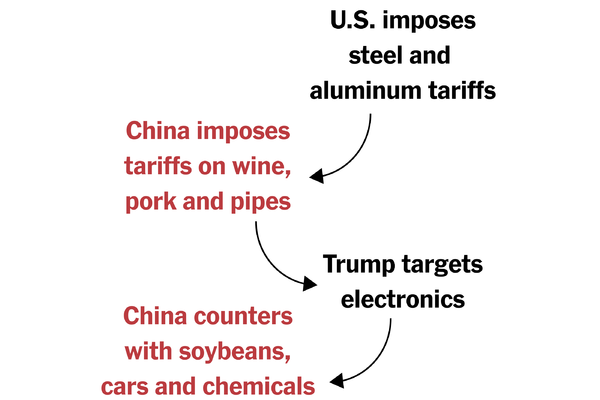U.S. Allies And The Lingering Effects Of Tariffs After China Agreement

Table of Contents
The Unintended Consequences for European Allies
The tariffs initially aimed at China significantly impacted transatlantic trade relations. The EU, a major trading partner of the U.S., faced increased costs for exporting goods to the American market. This resulted in retaliatory tariffs from the EU, creating a tit-for-tat scenario that stifled economic growth in several sectors. The resulting economic slowdown exacerbated existing challenges and strained relationships between the U.S. and the EU.
- Increased costs for European businesses: Tariffs increased the price of European goods in the U.S., reducing their competitiveness and market share.
- Reduced competitiveness: Higher prices made European products less attractive to American consumers, leading to reduced sales and impacting European businesses' profitability.
- Negative impact on EU agricultural exports: The agricultural sector was particularly hard-hit, with significant losses in exports of products like cheese and wine.
- Strain on transatlantic relations: The retaliatory tariffs and economic fallout fueled tensions and complicated ongoing diplomatic efforts between the U.S. and the EU. This highlighted the interconnectedness of global trade and the far-reaching implications of unilateral trade policies.
Impact on Asian Allies in the Post-Agreement Landscape
U.S. allies in Asia, including Japan and South Korea, also experienced significant challenges due to the lingering effects of tariffs and supply chain disruptions. The uncertainty surrounding trade policies led to shifting investment strategies, with some companies diverting investments away from the U.S. in favor of regions with greater predictability. This impacted regional trade agreements and the overall economic stability of the region. Navigating the complex interplay between U.S. and Chinese trade policies became a significant challenge.
- Increased reliance on alternative trade partners: Some Asian nations sought to diversify their trade relationships, reducing their dependence on the U.S. market.
- Shifting investment strategies: Uncertainty surrounding U.S. trade policies led some companies to reduce investments in the U.S. and explore opportunities elsewhere.
- Challenges in maintaining regional stability: Economic uncertainty created by the trade war exacerbated existing tensions and complicated regional cooperation efforts.
- Navigating US and Chinese policies: Asian nations faced the difficult task of balancing their relationships with both the U.S. and China in a complex and rapidly evolving trade environment.
Long-Term Effects on Global Supply Chains and Trade Relationships
The tariffs have had profound and lasting impacts on global supply chains. The need for diversification and increased resilience in the face of future trade disputes has become increasingly apparent. Businesses now face increased costs and complexities in managing their global supply chains, prompting a reassessment of existing strategies and a renewed focus on risk mitigation. The resulting trade policy uncertainty contributes to broader geopolitical risks, underscoring the interconnected nature of global economics and politics.
- Production shifts: Companies are shifting production away from China, but this shift isn't always to the U.S., leading to broader supply chain restructuring.
- Increased costs and complexities: Managing global supply chains has become more expensive and complex, requiring businesses to adapt to new logistical challenges and regulatory hurdles.
- Rise of regional trade agreements: Countries are increasingly turning to regional trade agreements to mitigate the impact of U.S. trade policies and create more stable trade relationships.
- Emphasis on supply chain diversification and resilience: Businesses are prioritizing diversification and resilience in their supply chains to reduce vulnerability to future disruptions.
The Role of International Organizations in Mitigating the Effects
International organizations like the World Trade Organization (WTO) play a crucial role in mediating trade disputes and fostering multilateral cooperation. However, their effectiveness in addressing the challenges stemming from the lingering effects of tariffs is limited. The WTO's dispute resolution mechanisms can be slow and cumbersome, and the lack of a strong global regulatory framework often leaves countries vulnerable to unilateral trade actions. The limitations of the WTO highlight the need for stronger international cooperation and a commitment to multilateralism to effectively manage global trade relations.
Conclusion
The U.S.-China trade agreement's lingering effects have significantly impacted U.S. allies, causing economic hardship, disrupting supply chains, and straining international relationships. The unintended consequences underscore the need for a more balanced approach to trade policy, recognizing the interconnectedness of the global economy and the importance of mitigating negative impacts on allied nations. Further research into the ongoing effects of tariffs on global trade is crucial. Understanding the strategies employed by governments and businesses to navigate this complex landscape is essential for building a more resilient and equitable global trading system. We urge you to engage in informed discussions about the future of global trade and the importance of robust international cooperation to overcome the challenges related to the lingering effects of tariffs on U.S. allies.

Featured Posts
-
 Gazze Ye Yardim Malzemesi Tasiyan Tirlarin Girisi Son Durum
May 19, 2025
Gazze Ye Yardim Malzemesi Tasiyan Tirlarin Girisi Son Durum
May 19, 2025 -
 Cancellation Of Park Music Festivals Impact Of Court Ruling
May 19, 2025
Cancellation Of Park Music Festivals Impact Of Court Ruling
May 19, 2025 -
 The Trial A Complete Breakdown Of Teas Crime And Family Outcome
May 19, 2025
The Trial A Complete Breakdown Of Teas Crime And Family Outcome
May 19, 2025 -
 Florida State University Shooting A Victims Family History
May 19, 2025
Florida State University Shooting A Victims Family History
May 19, 2025 -
 Powerful Tornadoes Cause 25 Deaths Massive Destruction In Central Us
May 19, 2025
Powerful Tornadoes Cause 25 Deaths Massive Destruction In Central Us
May 19, 2025
